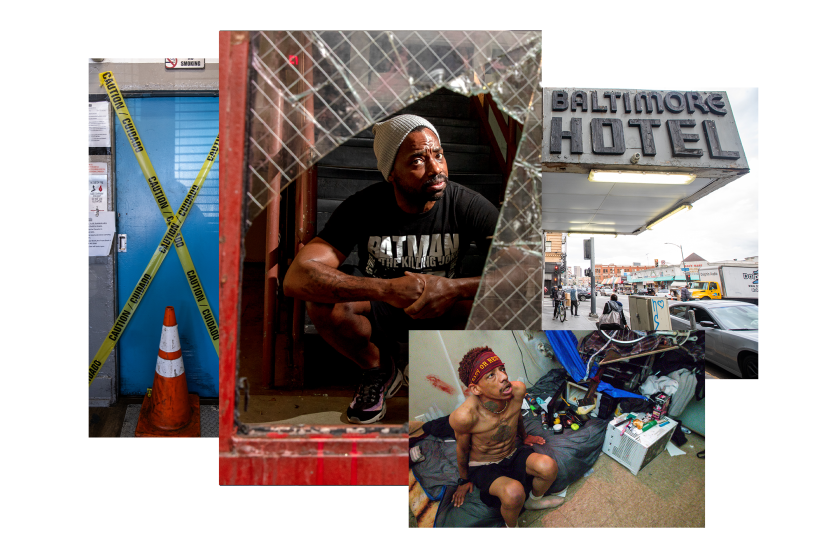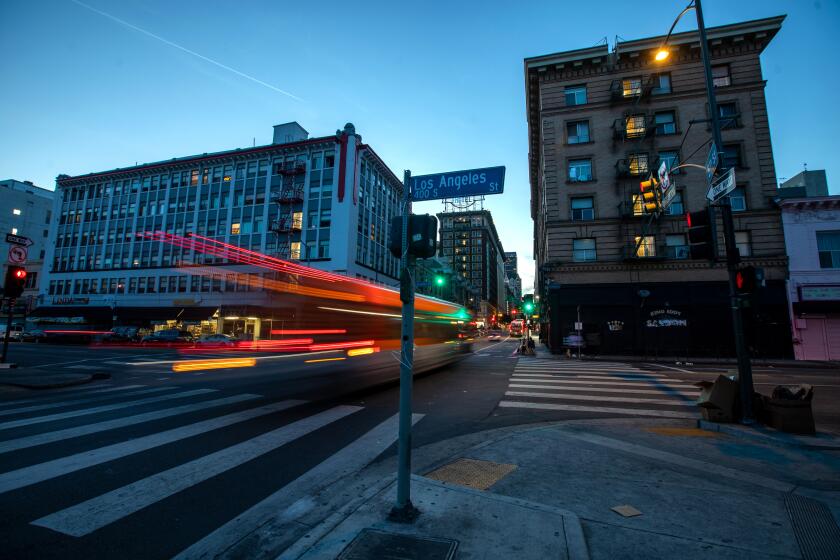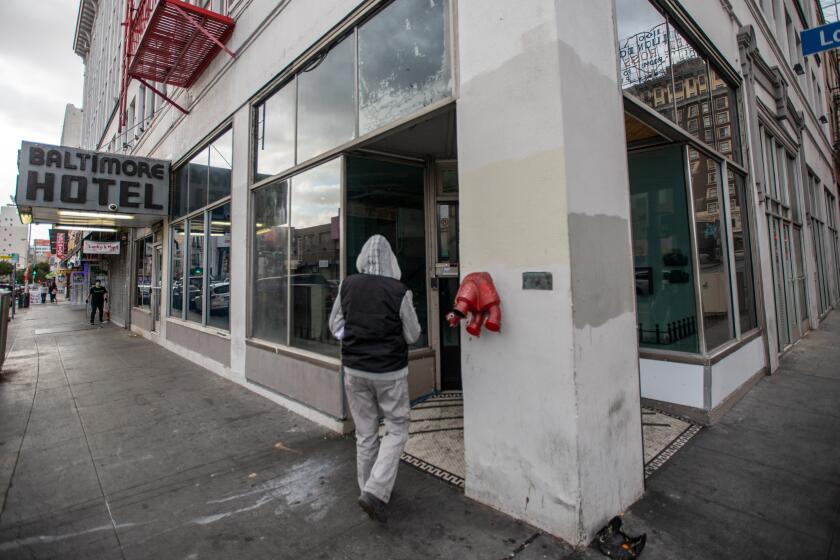A deal to buy Skid Row homeless housing fell apart. Here’s why vulnerable tenants and taxpayers are at risk

An agreement for the world’s largest AIDS charity to buy a half-dozen troubled homeless housing developments in Skid Row collapsed Thursday, throwing into disarray the future of the properties and the city’s rescue efforts for one of its largest supportive housing portfolios.
The AIDS Healthcare Foundation had reached a deal this month to buy six buildings owned by the Skid Row Housing Trust for $27 million in a receivership sale. But foundation spokesperson Ged Kenslea said in a statement Thursday that the nonprofit discovered the properties needed millions of dollars in further repairs and were on track to continue suffering large operating losses.
“Any buyer of these properties will find themselves in the same situation that led to the failure of Skid Row Housing Trust in short order unless a new model can be developed,” Kenslea said.
Recently, The Times has been investigating Skid Row’s troubled housing providers, digging into the failures of nonprofits such as AIDS Healthcare Foundation.
The foundation’s statement came hours before the city of Los Angeles filed court documents opposing the sale. The city and foundation had not agreed on plans to maintain comprehensive social services for tenants and resolve remaining health and safety code violations, the city’s court filing said. The filing said the city would have withdrawn its objection if such terms had been reached.
“The city is committed, as evidenced by its $36.5 million investment in the receivership, to preserve permanent supportive housing for the city’s most vulnerable residents,” Deputy City Atty. Alia Haddad wrote in the filing.
The unraveling of the sale adds another obstacle to efforts to salvage the trust properties, and potentially puts the city on the hook to increase the funding it has already authorized to rehabilitate and operate the buildings over the last year.
Jackson Wyche, a senior project manager with Receivership Specialists, the firm managing the Skid Row Housing Trust portfolio, said last week that the receiver spent months exploring options and that the foundation’s offer for the six buildings was “the only viable path forward.”
“The alternative is the properties having no owners, being abandoned and all of the residents being displaced,” Wyche wrote in an April 17 email obtained by The Times. Wyche was corresponding with Annette Harings, an attorney who has represented foundation tenants in more than half a dozen lawsuits against the nonprofit since 2019.
Receivership Specialists said in court filings last week that if the sale to the foundation was not approved by May 10, the receivership’s bank accounts would be empty by the end of the month.
Wyche declined to comment on his email exchange with Harings, but told The Times on Thursday his firm was working with the city to resolve financing and ownership challenges.
“We are engaging with prospective purchasers and hope to have a new deal in place in the next two weeks (possibly sooner),” Wyche said.
After Skid Row Housing Trust financially collapsed in February 2023 and largely abandoned its 29 buildings and 1,500 formerly homeless tenants, the city pushed its portfolio into a receivership in Los Angeles County Superior Court. Since then, 11 of the trust’s newer and better maintained properties have been transferred to established nonprofit homeless housing providers.
That’s left 18 buildings without new owners. Receivership Specialists has put the properties, many of which are older single-room occupancy hotels without private bathroom facilities, up for sale on the condition that they remain housing for formerly homeless residents.
Last week, the receiver recommended that L.A. Superior Court Judge Stephen Goorvitch approve AIDS Healthcare Foundation’s $27-million bid, which included $5 million for ongoing repairs, to buy the Boyd, Hart and St. George single-room occupancy hotels and the Lincoln, New Carver and Rainbow apartments. The six buildings have 415 units in total.
The Hollywood-based foundation became a Skid Row landlord in 2017 and has since purchased 16 properties with about 1,500 units in and around the neighborhood. Foundation officials contend that they’ve filled a gap in preserving homeless housing where public agencies, other nonprofits and the private market have failed.
But the foundation’s buildings have been replete with problems, as detailed in a Times investigation last fall. The Times found electrical, plumbing and other system failures, vermin infestations, dozens of evictions and, in some cases, increased violence and tenant code and public health complaints after the nonprofit took over the properties.
A Times investigation has found that many of the AIDS Healthcare Foundation’s more than 1,300 residents live in squalid conditions, with dozens under the threat of eviction.
The effort to sell the trust buildings to the foundation attracted opposition from state housing officials and some Skid Row advocates. The California Department of Housing and Community Development sent a letter to the receiver last month saying the foundation “would not be a suitable owner and operator” for trust buildings, citing The Times’ reporting.
In a court hearing last week, Melody Osuna, an attorney for the Los Angeles Community Action Network, which organizes low-income tenants in Skid Row, said the group planned to ask Goorvitch to stop the sale to the foundation.
“We will have testimony from tenants in their buildings about habitability, evictions and other concerns that we have that the buildings could fall back into the state that brought them into receivership,” Osuna said.
Formal opposition to the foundation’s purchase was due to be filed to Goorvitch on Thursday.
The AIDS Healthcare Foundation, which has struggled to operate housing for the formerly homeless, has agreed to pay $27 million to buy six Skid Row properties out of receivership.
Before Thursday’s filing, the city had not taken a public position on the deal. Clara Karger, a spokesperson for Mayor Karen Bass, had said in prior statements that the receiver informed the city that foundation was the only organization that had made “a financially feasible offer” for the buildings. She also said that the city needed to ensure that tenants were provided with broad social services.
Residents in trust buildings have been entitled to receive case management, mental health and other services as part of their voucher programs. But the foundation does not offer services in many of its buildings, citing the cost.
The departure of the AIDS Healthcare Foundation, which makes more than $2 billion in revenue annually, largely from its network of pharmacies, likely takes away the most deep-pocketed potential owner for the portfolio.
Kevin Singer, founder and president of Receivership Specialists, said in court filings last week that three other bidders, whom he declined to name, made substantive offers for the trust portfolio. But those offers were lower than the foundation’s or involved complicated financing that the receiver believed was not viable, Singer said.
More to Read
Sign up for Essential California
The most important California stories and recommendations in your inbox every morning.
You may occasionally receive promotional content from the Los Angeles Times.










